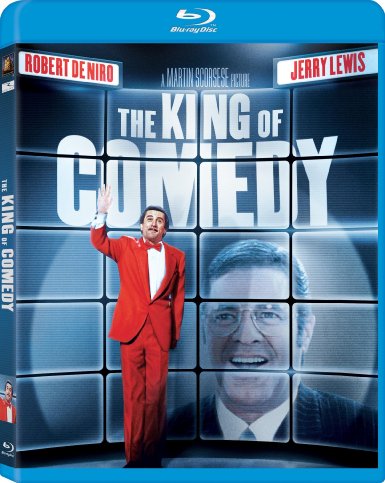
The King of Comedy by Martin Scorsese
You laughin’ at me?
The King of Comedy (1983) is among the least popular Martin Scorsese’s movies.
And truth to tell, there are good reasons for that. It’s not as spectacular as Mean Streets. Not as poignant as Raging Bull. Not as shocking as Taxi Driver. Or nowhere near as violent as Goodfellas.
Besides, its plot is banal and frankly ludicrous.
A delusional wannabe comedian, Rupert Pupkin (Robert De Niro), is obsessed with Jerry Langford (Jerry Lewis), host of a late-night show. One day Pupkin buttonholes Langford and begs him for an appearance on his show. Langford, in order to get Pupkin off his back, gives him his secretary’s phone number. After numerous rejections from Langford’s staff, the humiliated Pupkin, assisted by his batty sidekick Masha (Sandra Bernhard), kidnaps Langford, and holds him hostage in exchange for a spot on his show. Pupkin eventually does a standup act on TV, becomes an overnight sensation, and lands a book deal – although it’s quite conceivable that this whole story might be a figment of his twisted imagination.
To be honest, there is nothing extraordinary about the film’s simple structure, familiar (if not overfamiliar) themes – the American Dream, the obsession with the rich and famous, the pursuit of success at all cost, etc. – or its minimalist style, which might come as a surprise to viewers accustomed to the visual richness of Scorsese’s movies. And yet few films I’ve seen are as evocative or thought-provoking.
Witness the first scene with the freeze-frame of a star-struck groupie (Masha) banging her hands on the window inside Langford’s limo. Add to that Ray Charles’s glorious performance of Come Rain Or Come Shine, and you feel, about five minutes into the movie, that you’re watching a masterwork. Or try the rehearsal of Pupkin’s standup routine with cardboard cut-outs on a set built in a basement. In the end the camera tracks away, and Pupkin is reduced to a small, pathetic figure trapped in a claustrophobic space (or is it his sick mind?). And that canned laughter, increasingly creepy… You can’t miss the scene where Pupkin fantasizes about talking to Langford in a restaurant, giving a fan an autograph and declining to take over the Jerry Langford Show for a while (It’s impossible! It’s impossible!). Note the smooth transition to cloud-cuckoo-land and the sudden return to the here and now – a neat trick. Or take the hilarious scene where Masha, after helping Pupkin carry out the kidnapping, entertains the duct-taped Langford in a room full of burning candles. At one point Masha sings Come Rain Or Come Shine, except that she changes You’re gonna love me, etc. to I’m gonna love you. Masha demands to be loved, or else! What was it Sarah Vaughan sang? Whatever Lola wants/ Lola gets/ And little man/ Lola wants you… And finally the closing scene where Pupkin does his crude shtick on the Jerry Langford Show, cracks up the audience, and becomes, as they say, a household name. It’s always funny to see a talentless hack win popular acclaim, no question about that. But the funniest thing is, when Pupkin confesses that he hijacked Langford only to break into show business (because it’s better to be king for a night than schmuck for a lifetime), the studio audience is in stitches, thinking that his confession is only a joke. Similarly, when Langford calls his associates for help, they don’t take him seriously at all – they assume his phone call is just a gag. One of the execs even asks him specific questions (What do we call our second cameraman? What’s his favorite color?) to make sure he’s speaking to the right person.
The King of Comedy, in its essence, is all about (self-) deception. Look closely and you will see that everyone in the movie deceives, or is deceived by, everyone else – think Rita, or Langford’s, and later Pupkin’s, fans. And there’s no doubt that everyone, except perhaps for Rita, is quite happy to deceive and to be deceived. Or maybe we should replace “they” with “we”? Now, let’s be frank – would you swear, hand on heart, that you’ve never… ever… like Pupkin… that geek… that loser… or like Masha… that…urgh… nah…. no way… never!
The King of Comedy cuts uncomfortably close to the bone and makes us think self-censored, deeply buried, unthinkable thoughts.
Viewer discretion is therefore strongly advised.
© by Krzysztof Mąkosa
Director: Martin Scorsese
Writer: Paul D. Zimmerman
Starring: Robert De Niro, Jerry Lewis, Sandra Bernhard
Supporting actors: Diahnne Abbott (De Niro’s wife at the time the film was made, as Rita), Shelley Hack (as Cathy Long, Langford’s assistant), Margo Winkler (as Receptionist), Catherine Scorsese (director’s mother, as Pupkin’s Mother, heard only as an off-screen voice), Charles Scorsese (director’s father, as First Man at Bar), Cathy Scorsese (director’s daughter, as Dolores), Martin Scorsese (as TV Director), et al.
